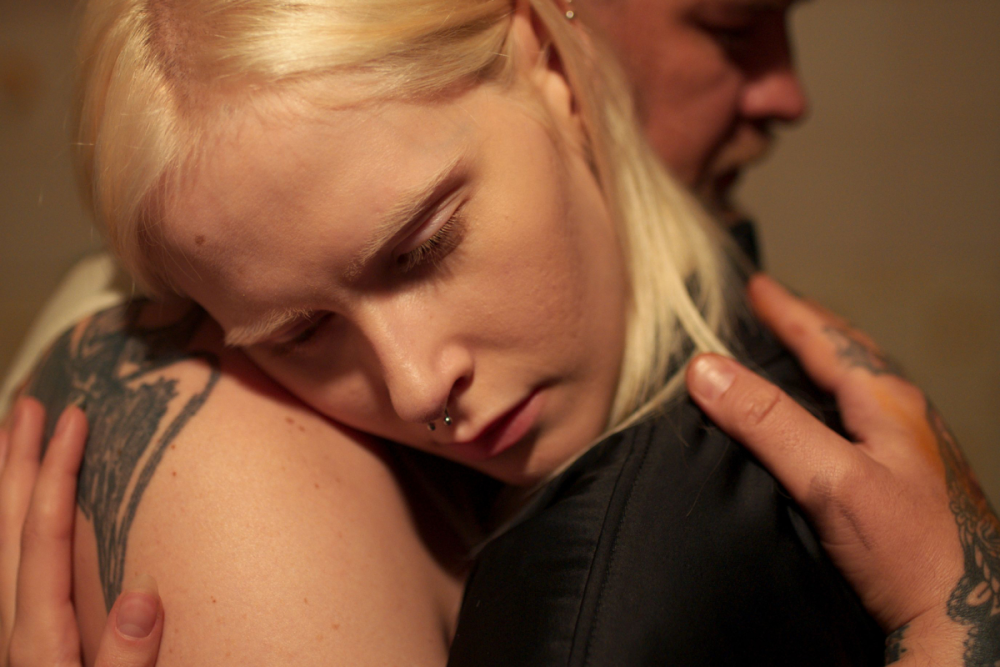White Snail
White Snail
VERDICT: A morgue in Belarus is the unlikely setting for new hope to seed in an unsettling, unusual drama from Elsa Kremser and Levin Peter.
Death is a constant presence and confrontational obsession in White Snail, the unsettling and unusual drama from Austrian-German directing duo Elsa Kremser and Levin Peter, in which a morgue in Belarus becomes the unlikely ground for new hope and perspectives to bloom.
Screening in the feature competition at the Sarajevo Film Festival after its world premiere at Locarno, the film is a fresh departure from the duo’s prior, widely played documentaries about strays on Moscow’s streets, Space Dogs (2019) and Dreaming Dogs (2024), though it echoes their sense of mysterious connection on the margins. The film’s macabre leanings are bound to divide, especially its treatment of the allure of suicide, but its earnest emotional power should mitigate any misgivings over its morbid themes and dark stylisation. In some spiritual practices, the contemplation of a corpse is a means to better understand existence and impermanence, and there is something of this philosophical worldview underpinning White Snail. Its moody vision of a nighttime of the soul favours reflection over provocation, with death ultimately a metaphor for oppression and exile, and the transformative potential of accepting change. The prospect emerges of a slow rebirth as strange and fantastical as the glistening snails with shelled backs and pallid antennae that the central protagonist keeps as pets. The atmospheric if somewhat hazy and unspecific take on a Minsk now little seen in features should add to festival interest.
Platinum blonde and so pale she uses an umbrella in bright sun, with a wispy frame and pierced septum, Masha (Marya Imbro) has a ghostly outsider air that makes the young woman seem between this world and the next. She narrowly survives a deliberate overdose and is released from hospital, but anxiety over her future still envelopes her, rooted in the political instability of a Belarus shot on dimly lit streets and in dark bars that seem made for secrets. The nature of the regime is dealt with only obliquely, but border transit points to the European Union are closing up, and news items speak of military drills. Citizens are rushing to emigrate, even as they wrestle with the fear of not being able to return. Masha discusses work visas with her father, who is already in Poland, but she is pinning her main hope of escape on a job in Guangzhou. She is in the early stages of a modelling career, building an online profile through selfies and videos, and is on the radar of agents in China. The toxic beauty standards of the industry are front and centre: rake-thin girls at her modelling school are advised to lose weight, and the rigorous, unhealthy demands have led to Masha having a history of disordered eating.
Modelling’s obsession with surface image is a distraction but no cure for the turmoil that remains inside Masha’s body, nor are the kooky exorcism sessions with candles her mother carts her off to as a desperate resort for her depression. Inner healing stems, instead, from an unexpected place, and an encounter one rainy night at the local morgue, where young, tattooed autopsy mortician Misha (Mikhail Senkov, in a sensitive turn that brings the empathy needed to deepen the story) works alone on nightshifts. Misha is also a painter, focused on the human biological form — a pastime delving into the taboo that puts him out of favour with the authorities.
An undefined bond refreshing for its lack of overt sexual charge grows with a faltering uncertainty between the two misfits, which pushes them from their comfort zones. Misha senses her deep sadness, but it’s her spiky fear of emotional intimacy that will prove the most difficult to reconcile. Emotional and existential complexity develops as the pair travel to Misha’s hometown, a village frequented by seers and healers, where the superstitions threaded through the uncertainty of life in Belarus are even more pronounced. The otherworldly takes on a greater, more disquieting magnitude here, with the help of a sparse but dramatic score. A ritual at the base of a tree is customary to grant wishes and alleviate psychological issues; a lake said to be the home of spirits glimmers in the sun. Masha spurns the beliefs of the village, to Misha’s chagrin. Meaning in a horizon of thin prospects and suffocating politics is not clearcut for either of them, but affinity in confusion and otherness brings a new burst of hope into view.
Directors, Screenwriters: Elsa Kremser, Levin Peter
Producers: Lixi Frank, David Bohun, Elsa Kremser, Levin Peter
Cinematographer: Mikhail Khursevich
Editor: Stephan Bechinger
Cast: Marya Imbro, Mikhail Senkov
Production companies: Panama Film, Raumzeitfilm (Austria), Ma.ja.de (Germany)
Sales: Intramovies
Venue: Sarajevo (Feature Competition)
In Russian, Belarusian, English, Mandarin
115 minutes


